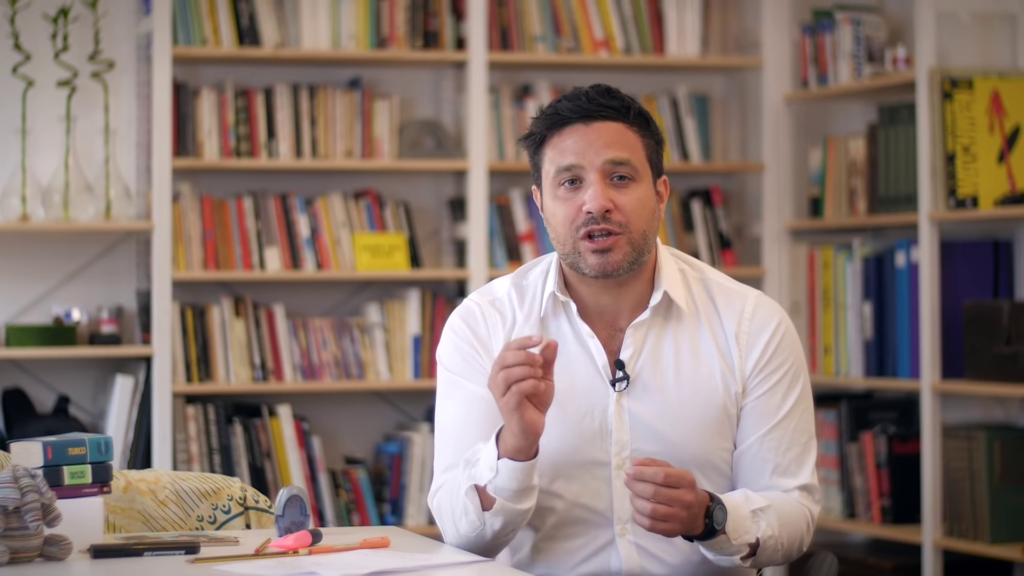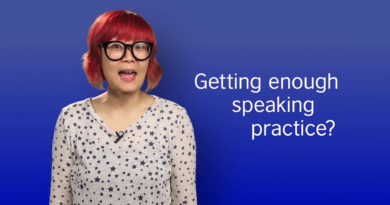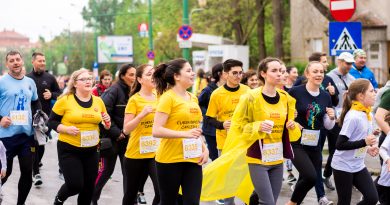Neste vídeo com 10m37s de duração, Luca Lampariello oferece 10 dicas matadoras para aprender do zero qualquer idioma. São técnicas que ele mesmo usou para se tornar um poliglota e dominar o conhecimento de 13 idiomas (italiano, inglês, espanhol, alemão, holandês, sueco, russo, português, mandarim, japonês e polonês).
Segundo afirma na descrição do vídeo, o objetivo destas técnicas é ajudar na largada, ajudá-lo a evitar a procrastinação e aumentar sua motivação. Na primeira parte do vídeo ele destaca a importância de se ter fortes razões pessoais para aprender qualquer idioma, fazer um bom planejamento, e encontrar um excelente recurso para o aprendizado que você realmente goste.
Na segunda parte do vídeo ele explica porque nós devemos focar 80% de nossos esforços na língua em si e apenas 20% na gramática, e apenas como fonte de consulta. Prossegue destacando a importância de aprender a dominar os sons do novo idioma desde o começo. Explica também porque é importante combinar recursos online com lápis e papel.
Finalmente, enfatiza a importância de recompensas culturais e sociais no aprendizado de um idioma e como estes fatores nos ajudam a manter a motivação no aprendizado de idiomas.
| English Transcript | Tradução |
|---|---|
| When I started learning languages myself, I wish I'd had a framework of five, seven, ten simple rules of thumb to follow to help me learn foreign languages. | Quando comecei a aprender idiomas, eu gostaria de ter tido uma estrutura de cinco, sete, dez regras básicas para seguir para me ajudar a aprender idiomas estrangeiros. |
| You're luckier than I am because I've compiled a list of ten rules of thumb to start learning ANY language from scratch. | Você tem mais sorte do que eu, porque eu compilei uma lista de dez regras básicas para começar a aprender QUALQUER idioma do zero. |
| When you start learning a language, always make sure that you know EXACTLY why you started learning that language. | Ao começar a aprender um idioma, sempre saiba exatamente por que começou a aprender esse idioma. |
| That is CRUCIAL. | Isso é CRUCIAL. |
| A lot of people make the mistake of starting learning a language without knowing why or maybe they just heard that that language is cool or maybe a friend of theirs is learning that language. | Muitas pessoas cometem o erro de começar a aprender um idioma sem saber o porquê ou talvez tenham acabado de ouvir que esse idioma é legal ou talvez um amigo deles esteja aprendendo esse idioma. |
| These are not strong reasons. | Estas não são razões fortes. |
| You have to find your own strong and valid reasons. | Você precisa encontrar seus próprios motivos fortes e válidos. |
| They're going to help you keep learning every single day. | Eles ajudarão você a continuar aprendendo todos os dias. |
| So one piece of advice is: take a piece of paper and jot down your reasons, and you have to check whether these reasons are really valid and really important for you. | Portanto, um conselho é: pegue um pedaço de papel e anote seus motivos, e você deve verificar se esses motivos são realmente válidos e importantes para você. |
| Like in any other field of life, we have a number of false convictions and false myths that we tend to believe in, when it comes to language learning, and in order to learn efficiently, well and by yourself, you have to get rid of these convictions. | Como em qualquer outro campo da vida, temos uma série de falsas convicções e falsos mitos em que tendemos a acreditar, quando se trata de aprendizado de idiomas, e para aprender com eficiência, bem e por conta própria, você precisa se livrar de essas convicções. |
| In order to do that, take a piece of paper and jot down all the negative convictions that you have towards learning. | Para fazer isso, pegue um pedaço de papel e anote todas as convicções negativas que você tem em relação à aprendizagem. |
| Let me give you an example: you probably must have thought - or still think - that in order to learn a language you have to go and live abroad. | Deixe-me dar um exemplo: você provavelmente deve ter pensado - ou ainda pensa - que, para aprender um idioma, você precisa morar no exterior. |
| That is not true! Or that you have to go to school. | Isso não é verdade! Ou que você tem que ir para a escola. |
| So: jot down all the possible convictions and false ideas that you have in your mind and pour them down on a piece of paper, so that you can take a look at them and start dispelling them. | Portanto, anote todas as convicções possíveis e idéias falsas que você tem em mente e coloque-as em um pedaço de papel, para poder dar uma olhada nelas e começar a dissipá-las. |
| This is really important to start learning on the right foot. | Isso é realmente importante para começar a aprender com o pé direito. |
| A very common mistake that people make when learning a language is to just throw themselves at the language without any planning. | Um erro muito comum que as pessoas cometem ao aprender um idioma é simplesmente se jogar no idioma sem nenhum planejamento. |
| What you have to do is actually plan beforehand. | O que você precisa fazer é planejar de antemão. |
| There's a very simple way in which you can do this: just take a piece of paper, jot down a date of reference and from that moment on, you tell yourself "I'm going to learn that language". | Existe uma maneira muito simples de fazer isso: basta pegar um pedaço de papel, anotar uma data de referência e, a partir desse momento, você diz para você mesmo: "Eu vou aprender esse idioma". |
| After that, you just have to come up with two or three simple goals, and you have to ask yourself this very important question: "what will I be able to do within two or three or six months? | Depois disso, você só precisa estabelecer dois ou três objetivos simples e se fazer esta pergunta muito importante: "o que poderei fazer dentro de dois, três ou seis meses? |
| This, in turn, will define the actions and the time that you will put to make it happen. | Isso, por sua vez, definirá as ações e o tempo que você investirá para que isso aconteça. |
| So, for example, you might need 30 minutes a day, over 45 or 60 minutes a day, this is really important, actually it's crucial, if you want to make it happen every single day. | Assim, por exemplo, você pode precisar de 30 minutos por dia, mais de 45 ou 60 minutos por dia, isso é realmente importante, na verdade é crucial, se você deseja que isso aconteça todos os dias. |
| And this creates continuity and it is single-handedly the ultimate secret to language learning: you have to learn EVERY SINGLE DAY, no matter what you do and no matter your background experience. | E isso cria continuidade e é, por si só, o segredo final do aprendizado de idiomas: você precisa aprender TODOS OS DIAS ÚTEIS, não importa o que você faça e quanta experiência prévia você tenha. |
| Okay, now you have compelling reasons and a solid plan of attack. | Ok, agora você tem razões convincentes e um sólido plano de ataque. |
| What is the next move? | Qual é o próximo passo? |
| It is to find good language learning resources and this is the point where a lot of people make crucial mistakes. | É encontrar bons recursos para o aprendizado de idiomas e este é o ponto em que muitas pessoas cometem erros cruciais. |
| So how many times has it happened that for example you find yourself wanting to download a lot of apps, find books and you find yourself with a pile of stuff and you don't even know how to start and where to start? | Então, quantas vezes aconteceu que, por exemplo, você deseja fazer o download de vários aplicativos, encontra livros e se encontra com uma pilha de coisas e nem sabe como começar e por onde começar? |
| Here's the catch: find just one good language learning resource and in order to do that don't look on the internet but go physically to a book store where you can establish a physical connection with that book: leaf through it, smell it, hold it: that's the way you can actually gauge whether you will want to use that learning resource. | Aqui está o problema: encontre apenas um bom recurso de aprendizado de idioma e, para fazer isso, não procure na internet, mas vá fisicamente a uma livraria onde você pode estabelecer uma conexão física com esse livro: folheie, cheire, segure : é assim que você pode avaliar se deseja usar esse recurso de aprendizado. |
| Find one, use it and then move on to something else. | Encontre um, use-o e depois passe para outra coisa. |
| This is absolutely crucial. | Isso é absolutamente crucial. |
| Once you have your language learning material, you have to learn how to use it. | Depois que você tiver seu material de aprendizado de idiomas, precisará aprender como usá-lo. |
| What is the best method? | Qual é o melhor método? |
| The answer: there is no one-size-fits-all solution because every brain is different. | A resposta: não existe uma solução única para todos, porque todo cérebro é diferente. |
| If you take a look at successful language learners, they'll learn in a different way. | Se você der uma olhada em alunos bem-sucedidos, eles aprenderão de uma maneira diferente. |
| There are some things that are common, but their methods are different. | Existem algumas coisas comuns, mas seus métodos são diferentes. |
| So, instead of looking at their method, just take a look at your method, start learning a language, and then readjust. | Então, em vez de olhar para o método deles, basta dar uma olhada no seu método, comece a aprender um idioma e, em seguida, reajuste. |
| So start learning a language and ask yourself: "is the method I'm using good for me?", "Is it efficient and is it enjoyable? | Então comece a aprender um idioma e pergunte a si mesmo: "o método que estou usando é bom para mim?", "é eficiente e agradável?" |
| If the answer is "yes" to both, then you are on the right track. | Se a resposta for "sim" a ambos, você está no caminho certo. |
| If the answer is "no" then this method is enjoyable but not efficient, it means is not good for you. | Se a resposta for "não", esse método é agradável, mas não eficiente, significa que não é bom para você. |
| If it's efficient but it's not enjoyable, you have to change and you have to abide by this line. | Se é eficiente, mas não é agradável, você precisa mudar e respeitar essa linha. |
| And remember once you've found the method that works for you, there's no nothing and nobody stopping you from learning that language. | E lembre-se de que, depois de encontrar o método que funciona para você, não há nada e ninguém que o impeça de aprender esse idioma. |
| When you start learning, whatever you do, remember this very simple rule of thumb: focus 80% on language and 20% on grammar. | Quando você começar a aprender, faça o que fizer, lembre-se desta regra muito simples: concentre 80% na linguagem e 20% na gramática. |
| Think about for example about a five or six year old kid. | Pense, por exemplo, em uma criança de cinco ou seis anos de idade. |
| They speak the language without knowing anything about grammar. | Eles falam o idioma sem saber nada sobre gramática. |
| Why? | Por quê? |
| Because they've internalized the language through exposure, and that's EXACTLY what you can do as an adult learning a second language. | Porque eles internalizaram o idioma através da exposição, e é EXATAMENTE o que você pode fazer como um adulto aprendendo um segundo idioma. |
| So as a rule of thumb, what you should do is: expose yourself as much as you can to dialogues and the real language and use grammar only as a reference so you can use grammar notes or you can even buy a grammar book but don't focus on that, use it just as a reference to help you understand the content of real language you expose yourself to. | Então, como regra geral, o que você deve fazer é: expor-se o máximo possível aos diálogos e ao idioma real e usar a gramática apenas como referência, para que você possa usar notas gramaticais ou até comprar um livro de gramática, mas não se concentre nisso, use-o apenas como referência para ajudá-lo a entender o conteúdo da linguagem real à qual você se expõe. |
| When I uploaded my first video in Swedish on YouTube I realized from the feedback that I had gotten that something was off with my pronunciation and intonation and I learned an important lesson: you have to learn the sound structure of the language FROM THE VERY BEGINNING, give it attention, give it care, because this down the line is gonna make a big difference. | Quando postei o meu primeiro vídeo em sueco no YouTube, percebi, pelo feedback que recebi, que havia algo errado com minha pronúncia e entonação, e aprendi uma lição importante: você precisa aprender a estrutura sonora do idioma DESDE O INÍCIO, dê atenção, cuidado, porque isso vai fazer uma grande diferença. |
| Imagine developing the wrong sound patterns in the language like tying a knot: the tighter it gets the more difficult it will be down the line to undo it. | Imagine desenvolver os padrões sonoros errados no idioma como dar um nó: quanto mais apertado, mais difícil será desfazê-lo. |
| The same thing goes for sounds so remember: take the time and put the energy into focusing how the sound structure of a language works from the very moment you lay hands and eyes and ears on the language. | O mesmo vale para os sons, lembre-se: reserve um tempo e concentre a energia em como a estrutura sonora de uma língua funciona desde o momento em que você coloca as mãos, os olhos e os ouvidos na língua. |
| This is going to make a huge difference down the line. | Isso fará uma enorme diferença ao longo do tempo. |
| Learning a language is never ever a linear process, things change down the path, you have to keep this in mind when it comes to choosing the way you learn languages, so you have to constantly readjust your methods, your approach and the time you spend with a language because this is a critical point. | Aprender um idioma nunca é um processo linear, as coisas mudam no caminho. Você deve ter isso em mente quando se trata de escolher a maneira como aprende idiomas, para reajustar constantemente seus métodos, sua abordagem e o tempo que gasta com um idioma porque este é um ponto crítico. |
| So for example, in my language learning path what I do at the beginning and what I do when I am an intermediate student or an advanced student is different. | Por exemplo, no meu caminho de aprendizado de idiomas, o que faço no início e o que faço quando sou um aluno intermediário ou avançado é diferente. |
| It's different in WHAT I do and HOW I do it and WHEN I do it. | É diferente no QUE faço e COMO faço e QUANDO faço. |
| At the beginning I use for example my bi-directional translation method, a method that I use to translate a language back and forth in order to understand the basic patterns of the language - but down the line, when I have a better command of the language, I would never dream of using that technique, that would be "old" "old-fashioned", I will use other techniques to adapt and change my strategy according to my competence . | No começo, eu uso, por exemplo, meu método de tradução bidirecional, um método que eu uso para traduzir um idioma para frente e para trás, a fim de entender os padrões básicos do idioma - mas ao longo do tempo, quando eu já tenho um melhor domínio da língua, eu nunca sonharia em usar essa técnica, que seria "antiga" "antiquada", usarei outras técnicas para adaptar e mudar minha estratégia de acordo com minha competência. |
| This is really important to remember so when you have found a method or a routine, use that routine for a certain amount of time but remember that there will come the time to change that routine and adapt it to your new competence. | É realmente importante lembrar que, quando você encontrar um método ou uma rotina, use essa rotina por um certo período de tempo, mas lembre-se de que chegará o momento de mudar essa rotina e adaptá-la à sua nova competência. |
| Do you see this phone and do you see this paper? | Você vê este telefone e este papel? |
| These are equally interesting and effective tools to learn any language you want. | Essas são ferramentas igualmente interessantes e eficazes para aprender qualquer idioma que você desejar. |
| Now what do you have to keep in mind is that a combination of these two things makes the difference, so it's not about using just paper or using just digital - it's about combining both. | Agora, o que você deve ter em mente é que uma combinação dessas duas coisas faz a diferença, por isso não se trata apenas de usar papel ou apenas digital - trata-se de combinar as duas coisas. |
| It is scientifically proven that when you use a piece of paper you're and you're using your pencil, or a pen and you're using your hand, you establish a connection with the words that you jot down, with the words that you see and you have to you don't have to be at the service of technology but you have to make technology be at your service, so technology gives you SPEED while paper gives you CONNECTION and if you combine speed with connection that will make wonders for your language learning endeavors. | Está cientificamente comprovado que, quando você usa um pedaço de papel e usa o lápis ou a caneta e a mão, estabelece uma conexão com as palavras que anota, com as que você vê e precisa: você não precisa estar ao serviço da tecnologia, mas precisa fazer com que a tecnologia esteja ao seu serviço, para que a tecnologia lhe dê VELOCIDADE, enquanto o papel lhe dê CONEXÃO e, se você combinar velocidade com conexão, isso fará maravilhas pelos seus esforços de aprendizado de idiomas. |
| I started learning Romanian a few years ago, but unfortunately I gave up after a few weeks. | Comecei a aprender romeno alguns anos atrás, mas infelizmente desisti depois de algumas semanas. |
| Why did that happen? | Por que isso aconteceu? |
| When looking back I realized that the reason, or the main reason why it happened is because I didn't establish human contact. | Ao olhar para trás, percebi que a razão ou a principal razão pela qual isso aconteceu é porque não estabeleci contato humano. |
| I kept reading books I kept listening to things but that was not enough for me, so a very important lesson I've drawn from that is that you have to have rewards down the path, it's not just about hitting the books it's about discovering things, making connections sharing laughs, and you have a lot of different kind of rewards: you have social rewards for example you can have a conversation on skype or you can meet a person face-to-face in a bar and trying to speak that language or you have cultural rewards: reading a book an interesting book in that target language by a famous author, or watching a movie in that target language and all these rewards create a sense of continuity, you want to continue. | Continuei lendo livros, continuei ouvindo coisas, mas isso não foi suficiente para mim, portanto, uma lição muito importante que tirei é que você precisa ter recompensas pelo caminho, não se trata apenas de acertar os livros, é descobrir coisas , fazer conexões compartilhando risadas e você tem muitos tipos diferentes de recompensas: você tem recompensas sociais, por exemplo, pode conversar no skype ou pode encontrar uma pessoa pessoalmente em um bar e tentar falar esse idioma ou você tem recompensas culturais: lendo um livro, um livro interessante nesse idioma de destino por um autor famoso, ou assistindo a um filme nesse idioma de destino e todas essas recompensas criam uma sensação de continuidade, você deseja continuar. |
| Imagine learning a language like walking down the path, you stop at certain cities and then you take a rest, you get to know people and that in turn will help you keep going and this is what language is all about. | Imagine aprender um idioma como trilhar um caminho, parar em determinadas cidades e depois descansar, conhecer pessoas e isso, por sua vez, ajudará você a seguir em frente e é disso que se trata. |
| At the end of the day, it is about having experiences, talking to people, having laughs, discovering yourself and discovering others, and ultimately, it is about sharing. | No final das contas, é sobre ter experiências, conversar com pessoas, rir, descobrir a si mesmo e descobrir os outros e, finalmente, é compartilhar. |
| So here you have it these are the 10 rules of thumb to start learning any language. | Então, aqui está, estas são as 10 regras práticas para começar a aprender qualquer idioma. |
| If you want to know more details and more stories, more pictures and more links, you can click on the link in the description box below. | Se você quiser saber mais detalhes e mais histórias, mais fotos e mais links, clique no link na caixa de descrição abaixo. |
| Thank you very much. | Muito obrigado. |









